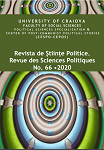Tales of Post-Communist Transition and Right-Wing Extremism. An Analysis of the 2000 Romanian Elections, 20 Years after
Tales of Post-Communist Transition and Right-Wing Extremism. An Analysis of the 2000 Romanian Elections, 20 Years after
Author(s): Mihaela IvănescuSubject(s): Politics and society, Crowd Psychology: Mass phenomena and political interactions, Transformation Period (1990 - 2010), History of Communism
Published by: Editura Universitaria Craiova
Keywords: Romania; post-communism; right-wing extremism; Greater Romania Party; presidential elections;
Summary/Abstract: In recent years, several European states have witnessed the emergence and / or intensification of the radical right, whose exponents have even managed to obtain very good electoral results in some cases. In Central and Eastern Europe, the success of right-wing extremism has been more visible in Poland or Hungary, but other states have also had their fair share of extremist movement in the years since 1990. Compared to the other states in the region, where political formations on the far right of the political spectrum became, in recent years, electorally viable, in Romania this trend did not take hold. Instead, the right-wing extremism has manifested itself outside the political class, within different groups or social movements. Of the Romanian right-wing political formations, the Greater Romania Party (PRM) had been the most successful, and the presidential election from 2000 represented the peak of the extremist political discourse in post-communist Romania. In this paper, we will analyze the Romanian general and presidential elections from 2000, with an emphasis on the PRM and its candidate, as the main center of right-wing extremism. PRM, as the analysis will show, had registered a double electoral success during these elections. On the one hand, it became the main opposition party in the Romanian Parliament; on the other hand, its candidate entered the second round of the presidential elections, managing to obtain, in the first round, almost one third of the valid votes cast. Consequently, the main thrust of the paper will be on discourse analysis, focusing, in particular, on the themes used in the electoral campaign for the presidential elections by the two candidates who qualified for the second round. Given that the incumbent president did not seek to be reelected, we argue that the right-wing surge witnessed during this period can be premised, in part, on the poor performance of the outgoing president and government from the 1996-2000 period. Similarly, electoral absenteeism also played a major role in PRM’s electoral success to a certain extent.
Journal: Revista de Științe Politice. Revue des Sciences Politiques
- Issue Year: 2020
- Issue No: 66
- Page Range: 83-94
- Page Count: 12
- Language: English

